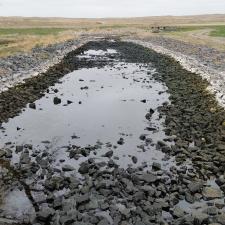The Nebraska Cooperative Republican Platte Enhancement Project, or N-CORPE, in Lincoln County has ceased Republican River Compact compliance operations for 2015.
N-CORPE is an interlocal agency made up of four Natural Resource Districts (NRDs) — the Upper Republican, Middle Republican, Lower Republican and Twin Platte NRDs.
“N-CORPE was formed ... to help Nebraska come back into compliance with the Republican River Compact,” said Kyle Shepherd, general manager of N-CORPE.
The project enhances stream flow by redirecting water that would have irrigated retired farmland owned by NCORPE in Lincoln County, pumping it into Medicine Creek where it eventually makes its way into the Republican River and down to Kansas.
For 2014, there was a shortfall of 42,000 acre-feet of water that needed to maintain compliance with the compact, and a shortfall of 18,800 acre-feet for 2015. N-CORPE’s pumping efforts brought Nebraska into compliance and prevented an irrigation shutdown of 300,000 acres of farmland in the Republican basin that would have occurred had Nebraska not come back into compliance.
“That would be 300,000 acres of crop land left idle,” Shepherd said.
Farmers could plant on the land, but there would be no guarantee they would be able to irrigate. Shepherd said losing that much farm land could cause a considerable hit to the market.
“An irrigation shutdown of that scale would have been a severe and unnecessary blow to the regional economy,” Shepherd said. “We’re pleased the project helped the basin avoid that outcome.”
The group is done pumping for the year or until it sees what the 2016 numbers will require.
A compact compliance accounting change from the U.S. Supreme Court means that in future years, less water will need to be pumped from N-CORPE. The change ensures that in compact compliance accounting, Nebraska is no longer charged with consuming water that seeps into the Republican basin from the Platte basin, according to a press release from N-CORPE. This credit may be approximately 10,000 acre-feet annually.
If that credit had been in place from 2013-15, Nebraska’s deficit would have been reduced by about 70 percent.





